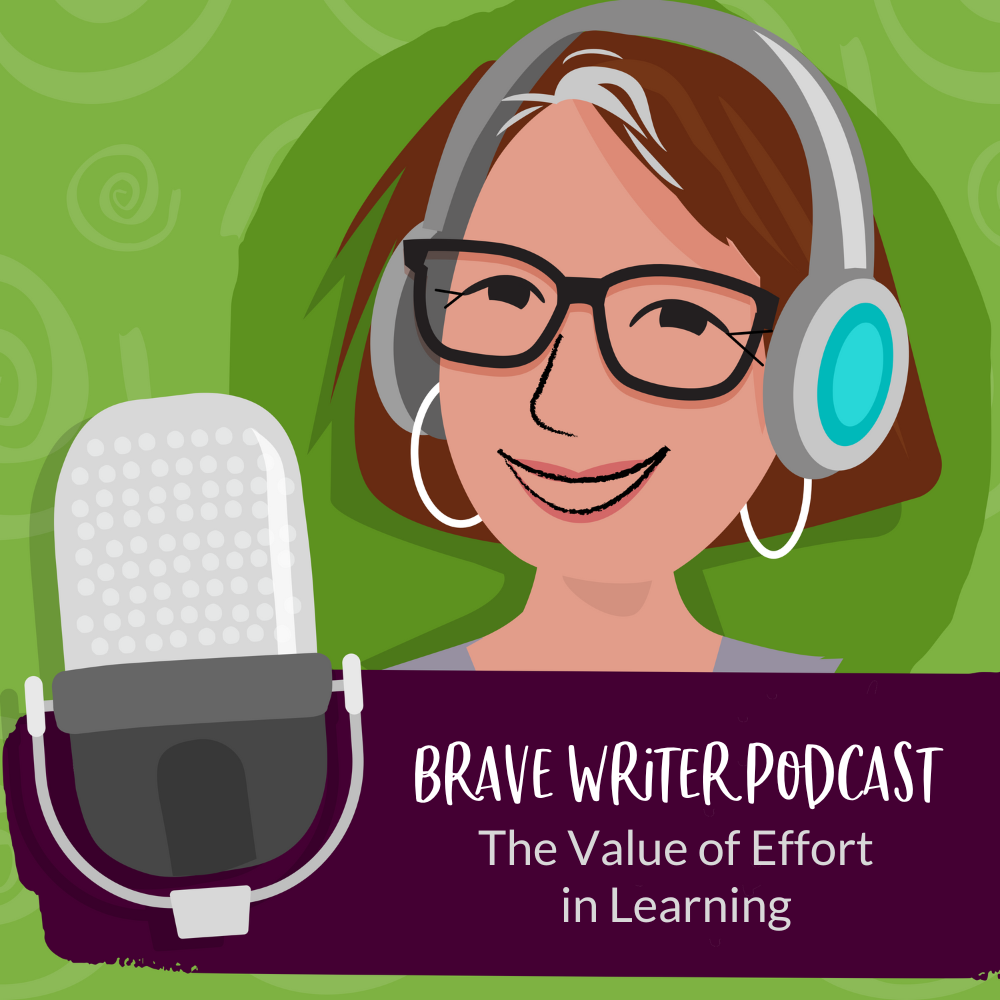[Podcast] The Value of Effort in Learning

In today’s homeschooling environment, misconceptions about learning often cloud our judgments. Key among these misconceptions – one I may be guilty of contributing to – is the belief that struggle is counterproductive to learning.
It’s essential, however, to understand that effort can contribute to an effective recall process. Drawing a line between unnecessary suffering and purposeful effort becomes crucial.
Effort, in this context, embodies:
- commitment,
- focused attention,
- and stamina.
And all are foundational for effective learning—what we call “retention.”
As Melissa and I navigate this topic on today’s Brave Writer podcast, we will introduce methods of learning that might seem challenging initially but promise richer, more immersive learning experiences with better results.
Show Notes
Ease vs. Effort
Striking the right balance between ease and effort can be likened to choosing between writing with a ballpoint pen and a fountain pen. While one might offer convenience, the other provides a satisfying experience, demanding more attention but yielding better engagement. Think about the comparison between reheating pre-cooked food in a microwave and cooking a meal from scratch. The latter, though demanding more effort, provides a deeper sense of accomplishment. It’s no surprise then that children often increase the difficulty levels in their games or why video games continuously switch activities to keep players engrossed.
Interleaving and the Benefit of Variety in Learning
In Make It Stick by Peter C. Brown, the author delves deep into strategies for effective learning, such as “interleaving.” Traditional math programs, for example, often linger on one method exhaustively before transitioning to another. Such a linear approach can be less effective than interleaving different processes, and blending workbook sessions with real-world applications. This multifaceted approach offers a more dynamic and holistic learning environment.
Games and Play in Learning
From board games to video games, gaming holds immense potential as a learning tool. For instance, a child’s fascination with a computer game like “Roller Coaster Tycoon” can seamlessly merge with projects involving handwriting, research, math, and even physics. Another game, “Harvest Moon,” can lead to complex calculations and in-depth research. These real-world applications underline the importance of experiential learning and position children as the ‘experts’, sometimes even teaching the parents.
Tying Real-Life Application to Learning Concepts
How do we make abstract concepts tangible for young learners? The bridge between workbook time and playtime is crucial here. Learning addition becomes more personally valuable when immediately followed by a game of Monopoly. Simple tasks, like adding chocolate chips to the completion of each problem can add a tiny incentive to stick with a challenge.
Sewing is a good example of how a child can be taught a variety of skills to accomplish a larger overall project like a string dress or doll quilt. Learning that involves a variety of processes may feel more difficult initially, but it leads to better retention overall.
When teaching, consider various forms of:
- measurement,
- historical context,
- and practical applications.
Activities that include context, whether understanding the length of a blue whale or the vastness of the universe, and that emphasize hands-on experiences and real-world applications, lead to the best learning outcomes.
The Truth About Your Child’s Attention Span
Surprisingly, according to SCALE, a child’s focused attention span equates roughly to a child’s age plus one minute. This finding debunks many preconceived notions about children’s attention spans. It’s pivotal to appreciate the cognitive and physical strains kids undergo when acquiring new skills, like handwriting. Recognizing what revitalizes or depletes a child’s energy can help adapt learning strategies.
Tools and Techniques to Galvanize Attention
Sometimes, it’s the allure of a fresh notebook or a new pen that can rekindle motivation. Brave Writer programs like the Quill, Dart, Arrow, and Boomerang tap into this idea of novelty by introducing new content monthly, thereby stimulating interest and engagement. A change in the environment or tools, or even a switch in timing, can provide that necessary jolt to reignite a child’s attention.
Creating a Learning Culture
When we want to understand the effort it takes to learn, Julie recommends approximating that learning experience for yourself as best you can. Julie’s personal experiment of copying text in unfamiliar languages, Dutch and Hindi, helped her understand what it might be like to do copywork in English as a new reader and writer. When parents model learning behaviors—be it drawing, music, or even diving deep into history—they demonstrate that learning is a continuous, shared journey.
Tips for Educators/Parents
For educators and parents, embracing varied learning methodologies is paramount. Instead of repetitive handwriting drills, they could incorporate diverse methods like copywork or tracing over highlighted content. Teaching handwriting can also be interactive, using materials like sand, rice, or even chocolate chips. Shifting between fine and gross motor skills can be immensely beneficial for younger kids. Traditional drilling methods should be reconsidered in favor of more experiential approaches like “learning by doing” or “learning by teaching.”
Lastly, it’s essential to recognize and respect a child’s energy levels, adjusting the learning schedule accordingly, and avoiding strictly regimented plans.
Resources
- Start a free trial of CTCmath.com to try the math program that’s sure to grab and keep your child’s attention!
- We’re starting our Story Switcheroo class right at the end of August! Take class fairytales and flip them on their heads with your whole family. Learn more at https://bravewriter.com/online-classes/story-switcheroo.
- Sign up for our Text Message Pod Ring to get podcast updates and more!
- Send us podcast topic ideas by texting us: +1 (833) 947-3684
- Want help getting started with Brave Writer? Go to bravewriter.com/getting-started
- Sign up for the Brave Writer newsletter to learn about all of the special offers we’re doing in 2022 and you’ll get a free seven-day Writing Blitz guide just for signing up: https://go.bravewriter.com/writing-blitz
- The book Julie referenced is Make It Stick by Peter C Brown: https://bravewriter.com/book-shop/book/make-it-stick
Connect with Julie
- Instagram: instagram.com/juliebravewriter
- Twitter: twitter.com/bravewriter
- Facebook: facebook.com/bravewriter
Produced by NOVA Media


















